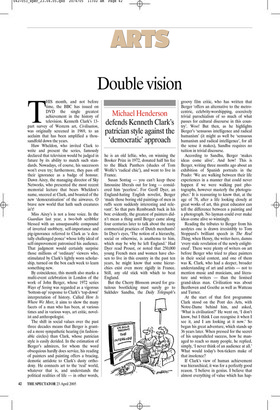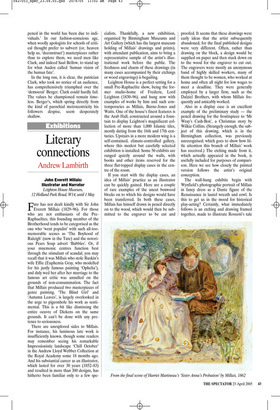Double vision
Michael Henderson defends Kenneth Clark’s patrician style against the ‘democratic’ approach
THIS month, and not before time, the BBC has issued on DVD the single greatest achievement in the history of television. Kenneth Clark’s 13part survey of Western art, Civilisation, was originally screened in 1969, to an acclaim that has been amplified a thousandfold down the years.
Huw Wheldon, who invited Clark to write and present the series, famously declared that television would be judged in future by its ability to match such standards. Nowadays, of course, his successors won’t even try; furthermore, they pass off their ignorance as a badge of honour. Dawn Airey, the managing director of Sky Networks, who presented the most recent memorial lecture that bears Wheldon’s name, sneered at Clark, and boasted of the new ‘democratisation’ of the airwaves. O brave new world that hath such creatures in’t!
Miss Airey’s is not a lone voice. In the Guardian last year, a two-bob scribbler blessed with an unsurpassable compound of inverted snobbery, self-importance and pig-ignorance referred to Clark as ‘a dentally challenged ponce’ whose lofty ideal of self-improvement patronised his audience. That judgment would certainly surprise those millions of ‘ordinary’ viewers who, stimulated by Clark’s lightly worn scholarship, turned on the box each week to learn something new.
By coincidence, this month also marks a multi-event celebration in London of the work of John Berger, whose 1972 series Ways of Seeing was regarded as a vigorous ‘bottom-up’ response to Clark’s ‘top-down’ interpretation of history. Called Here Is Where We Meet, it aims to show the many facets of a man who has been, at various times and in various ways, art critic, novelist and anthropologist.
The shift in social values over the past three decades means that Berger is granted a more sympathetic hearing (in fashionable circles) than Clark, whose patrician style is easily derided. In the estimation of Berger’s admirers, for whom the word obsequious hardly does service, his reading of painters and painting offers a bracing, demotic antidote to Clark’s dusty orthodoxy. He connects art to the ‘real’ world, whatever that is, and understands the political realities of life — in other words, he is an old leftie, who, on winning the Booker Prize in 1972, donated half his fee to the Black Panthers (shades of Tom Wolfe’s ‘radical chic’), and went to live in France.
Susan Sontag — you can’t keep these limousine liberals out for long — considered him ‘peerless’. For Geoff Dyer, an England-hating English novelist, Berger ‘made those boring old paintings of men in ruffs seem suddenly interesting and relevant’. So that puts Rembrandt back in his box: evidently, the greatest of painters didn’t mean a thing until Berger came along four centuries later to talk about the nasty commercial practices of Dutch merchants! In Dyer’s eyes, ‘The notion of a hierarchy, social or otherwise, is anathema to him, which may be why he left England.’ Had Dyer read Proust, or noted that 250,000 young French men and women have chosen to live in this country in the past ten years, he might know that some hierarchies exist even more rigidly in France. Still, any old stick with which to beat England.
But the Cherry Blossom award for gratuitous bootlicking must surely go to Sukhdev Sandhu, the Daily Telegraph’s groovy film critic, who has written that Berger ‘offers an alternative to the metrocentric, celebrity-worshipping, coercively trivial parochialism of so much of what passes for cultural discourse in this country’. Woo! But then, as he highlights Berger’s ‘sensuous intelligence and radical humanism’ (it might as well be ‘sensuous humanism and radical intelligence’, for all the sense it makes), Sandhu requires no tuition in trivial discourse.
According to Sandhu, Berger ‘makes ideas come alive’. And how! This is Berger, writing three months ago about an exhibition of Spanish portraits in the Prado: ‘We are walking between their life experiences in a manner that could never happen if we were walking past photographs, however masterly the photographer.’ It is reassuring to know that, at the age of 78, after a life looking closely at great works of art, this great educator can tell the difference between a painting and a photograph. No layman could ever make ideas come alive so winningly.
Reading the tributes to Berger from his acolytes one is drawn irresistibly to Tom Stoppard’s brilliant speech in The Real Thing, when Henry, the writer-hero, damns ‘every stale revelation of the newly enlightened’. There were plenty of writers on art before Berger who tried to place painters in their social context, and one of them was K. Clark, who had a deeper, broader understanding of art and artists — not to mention music and musicians, and literature and writers — than the lionised grand-ideas man. Civilisation was about Beethoven and Goethe as well as Watteau and Turner.
At the start of that first programme Clark stood on the Pont des Arts, with Notre-Dame behind him, and asked, ‘What is civilisation?’ He went on, ‘I don’t know, but I think I can recognise it when I see it, and I am looking at it now.’ So began his great adventure, which stands up 36 years later. When pressed for the secret of his unparalleled success, how he managed to reach so many people, he replied, simply, ‘I never think of an audience at all.’ What would today’s box-tickers make of that insolence?
If Clark’s view of human achievement was hierarchical, it was for a perfectly good reason. ‘I believe in genius. I believe that almost everything of value which has hap pened in the world has been due to individuals.’ In our fashion-conscious age, when woolly apologists for schools of critical thought prefer to subvert (or, heaven help us, ‘deconstruct’) masterpieces rather than to explore them, we need men like Clark, and indeed Saul Bellow, to stand up for what Auden called ‘human vision of the human fate’.
In the long run, it is clear, the patrician Clark, who took no notice of an audience, has comprehensively triumphed over the ‘democrat’ Berger. Clark could hardly fail. The values he championed remain timeless. Berger’s, which spring directly from the kind of parochial metrocentricity his followers despise, seem desperately shallow.




















































 Previous page
Previous page